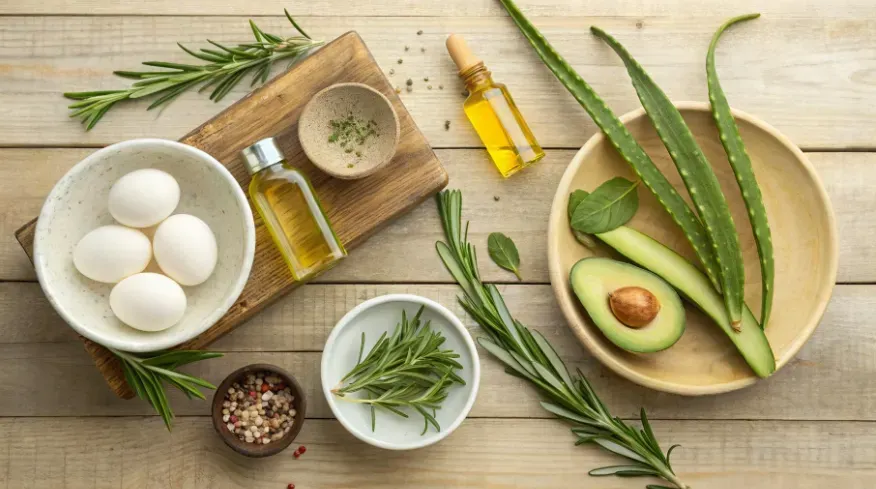What Is the Best Natural Remedy for Hair Loss?

Hair loss can feel like a slow, silent stressor—each extra strand on the pillow or in the drain sending a quiet signal that something’s off. The good news? There’s growing interest—and research—into natural remedies that don’t involve prescriptions or costly treatments. While no single remedy is a magic bullet, a combination of nature-based interventions can create real results over time.
From ancient Ayurvedic herbs to modern plant-based oils, many ingredients used for centuries are making their way back into our wellness routines. But what truly works? And how do you separate anecdotal advice from practices backed by biology? Let’s unpack the most promising natural approaches to hair loss and thinning—starting with the why behind it all.
Why Hair Loss Happens in the First Place
Before reaching for remedies, it's worth zooming out. Hair loss isn’t just about your hair—it’s often a sign of imbalance elsewhere. Hormonal fluctuations, chronic stress, nutritional deficiencies, poor scalp circulation, and inflammation are frequent culprits. And yes, your genetics can play a role, but they’re not the whole story.
In fact, many cases of hair thinning are telogen effluvium—a temporary condition caused by stress, illness, or poor diet. Identifying the cause is half the battle. That’s why a natural remedy should be part of a broader strategy that also supports hormonal balance, stress management, and nutrient intake.
Nature's Medicine Cabinet: Time-Tested Natural Remedies
Several herbs and plant-based treatments have earned reputations for promoting healthier, fuller hair. Saw palmetto, for instance, has been shown to block DHT, a hormone linked to hair thinning in men and women. Then there’s rosemary, a circulatory stimulant that supports blood flow to the scalp—essential for feeding hair follicles.
Another powerhouse is bhringraj, an herb widely used in Ayurvedic medicine. Studies suggest it may extend the anagen (growth) phase of hair. And let’s not forget aloe vera, whose anti-inflammatory and enzymatic properties help soothe the scalp and create a better environment for growth. These ingredients often work best when used regularly as oils, rinses, or supplements.
The Role of Essential Oils in Hair Regrowth
Essential oils aren’t just for relaxation—they may also spark new hair growth. In one randomized trial, rosemary oil was found to be as effective as minoxidil (the active ingredient in Rogaine) after six months of use, without the itchy scalp side effects. Lavender, peppermint, and cedarwood also show promise in stimulating follicles and reducing inflammation.
The key is consistency and proper dilution. Essential oils should always be mixed with a carrier oil like coconut, jojoba, or argan oil—both to protect your skin and improve absorption. A nightly scalp massage with a few drops of these oils not only nurtures your follicles but also improves circulation and reduces stress—another hidden enemy of hair health.
Nutritional Deficiencies That Sabotage Your Hairline
Your hair needs fuel to grow, and that fuel comes from your plate. Iron, vitamin D, zinc, B-complex vitamins, and protein all play pivotal roles in follicle function and keratin production. Even slight deficiencies can lead to shedding or thinning.
For example, low iron levels—even without full-blown anemia—can disrupt the hair cycle. Likewise, not getting enough biotin or protein might make your strands weaker and more prone to breakage. Including eggs, legumes, leafy greens, seeds, and fatty fish in your meals can make a visible difference over time. And if your diet is limited, consider talking to a practitioner about supplementation.
Homemade Hair Masks That Actually Work
DIY hair masks are more than just feel-good routines—they can deliver real nourishment. A simple mask made from egg yolk, olive oil, and honey delivers a protein-rich, hydrating boost that strengthens strands and soothes the scalp. Another popular combo: avocado and coconut milk, rich in essential fatty acids that restore shine and elasticity.
For dandruff-prone or inflamed scalps, a mixture of yogurt and fenugreek paste works wonders. Fenugreek contains nicotinic acid and proteins that support hair health, while yogurt’s probiotics calm irritation. Use these masks weekly for a visible difference in texture, volume, and scalp comfort.
Daily Habits That Hurt—or Help—Your Hair Health
Even the best remedy won’t work if your daily habits are sabotaging your progress. Overwashing, excessive heat styling, and tight hairstyles can all lead to breakage and traction alopecia. Harsh shampoos that strip your scalp of natural oils only make things worse.
Instead, build a routine that protects and supports. Switch to sulfate-free cleansers, air-dry when possible, and avoid brushing wet hair with force. Massage your scalp daily—even five minutes boosts circulation. And don’t overlook sleep and hydration; your hair, like the rest of your body, regenerates overnight and thrives on water.
When to See a Professional: Natural Isn’t Always Enough
There are times when hair loss signals a deeper health issue that needs medical attention. Sudden or patchy hair loss, for example, could point to autoimmune conditions like alopecia areata or thyroid imbalances. If natural remedies aren't moving the needle after a few months, it's smart to get blood work and see a dermatologist or trichologist.
Combining natural treatments with medical insight can offer the best of both worlds. Sometimes, a prescription topical or low-level laser therapy may complement your DIY efforts—especially when paired with stress management and better nutrition.
Final Thoughts: Making Nature Work for You
The best natural remedy for hair loss isn’t a single product or potion—it’s a holistic shift. When you nurture your body from the inside out and create consistent, gentle rituals that support scalp and follicle health, you give your hair the best possible chance to thrive.
Think of nature as a long game: slow, steady, and deeply connected to the root causes of health. Whether it’s rosemary oil, herbal teas, or iron-rich meals, each natural choice builds on the next. With patience and the right information, your hair can start telling a different story—one of growth, strength, and resilience.
References:
https://pubmed.ncbi.nlm.nih.gov/25842469/ – Rosemary oil vs minoxidil study
https://pubmed.ncbi.nlm.nih.gov/38792149/ – Saw palmetto and DHT blocking
